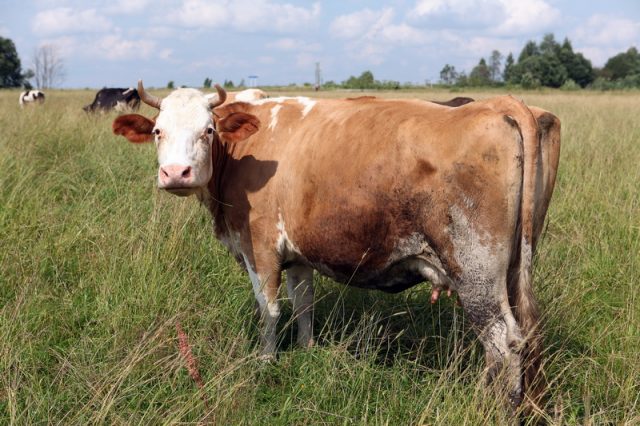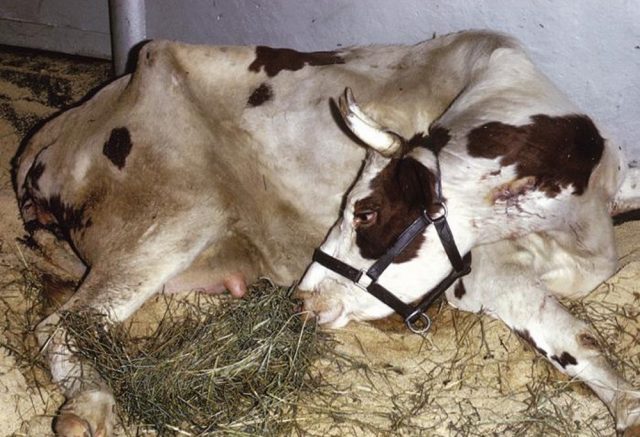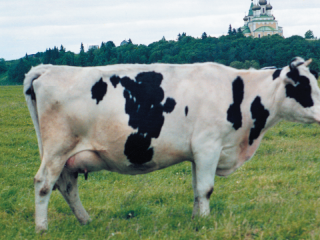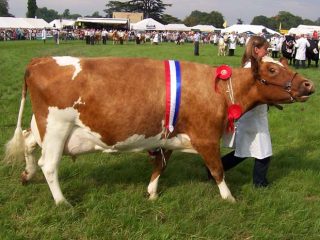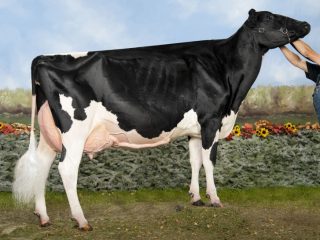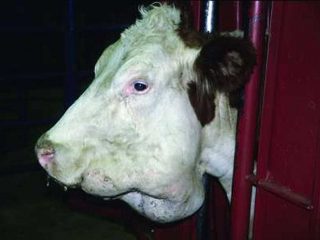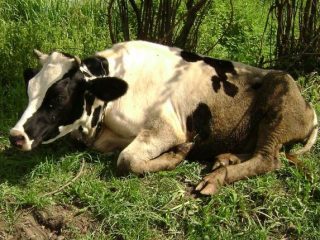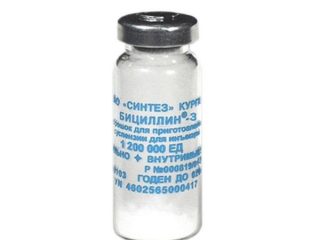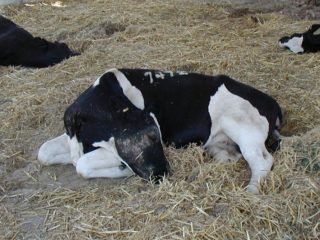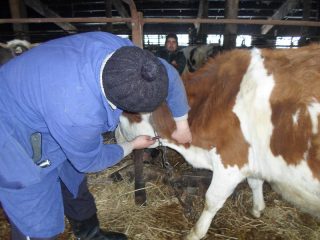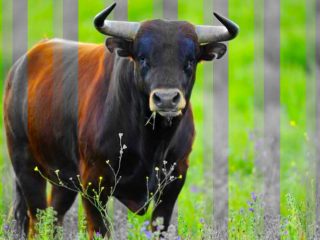Content
Vaginitis in cows is an infectious disease that causes swelling and irritation of the genitals. Most often, vaginitis is diagnosed in young animals that have reached breeding age, as well as in weakened and sick animals. Calves occasionally become ill.
The danger of the disease lies in its rapid spread - in a few days it can spread to the entire herd. In addition, vaginitis causes sexual dysfunction, including in bulls. At the first signs of infection, it is necessary to call a veterinary service worker, who must determine the type of disease and draw up a treatment plan in accordance with it. If proper measures are not taken in time, vaginitis can lead to a number of complications: endometritis, sepsis, etc.
What is vaginitis
Vaginitis (or colpitis) is an inflammation of the vaginal mucosa in a cow. The causative agent of the infection is most often the parasitic bacterium streptococcus.
There are several types of disease:
- Serous vaginitis - is expressed mainly in tissue swelling and minor hemorrhages.
- Catarrhal-purulent vaginitis The first signs, in addition to swelling, are ulcers, hemorrhages, erosion of the vaginal lining.
- Diphtheritic Vaginitis is determined by a sharp increase in the cow’s body temperature, bloody discharge with a strong odor and the presence of fibrinous films on the vaginal lining.
- Phlegmonous vaginitis is also expressed in an increase in the animal’s body temperature, but differs from the diphtheria subtype in the presence of purulent discharge mixed with necrotic tissue.
The incubation period for vaginitis in cows is 20 days.
Causes and risk factors
It is customary to distinguish the following ways of infection entering the cow’s body:
- Through close contact with other animals. A cow can become infected with vaginitis from sick individuals, including during mating - breeding bulls in this case act as carriers of the infection, however, their disease is asymptomatic.
- Through the environment. Vaginitis can be caused by keeping a herd in unsanitary conditions when infection occurs through musty or rotten bedding, slurry or dirty animal care items.
- Through superficial and internal damage to the genital organs. The bacterium enters the cow's body through injuries to the vulvar mucosa received during childbirth, if contaminated objects were used during delivery. Infection can also occur during insemination of a cow, either artificial or natural, if it is carried out in violation of veterinary and sanitary standards.
- Through a burn of the vaginal mucosa. There are frequent cases of infection during self-treatment of a cow, especially if drugs such as Vagotil and Lugol were used. Exceeding the dosage damages the mucous membrane of the genital organs, so at the first sign of discomfort in the cow, it is recommended to call a specialist.The veterinarian will calculate the required dose of the drug, which will reduce the likelihood of the animal developing vaginitis through burns to a minimum.
The course of the disease is long, and relapses occur frequently.
Symptoms of the disease
Vaginitis in cattle is determined by the following symptoms:
- the cow begins to behave restlessly for no apparent reason, gets easily irritated, and often wags its tail;
- the sick individual stands with an unnaturally arched back and legs spread wide apart;
- various types of discharge come from the vagina (purulent, mucous, bloody, etc.);
- the animal's labia swell and acquire a reddish tint;
- at the base of the tail, dried secretions accumulate on the inside, forming a dense crust;
- the cow urinates and defecates more frequently;
- with chronic vaginitis, nodular formations of a dark red color accumulate in the vagina, which over time lighten and become yellowish-white.
In bulls, colpitis is practically asymptomatic. Sometimes the disease becomes noticeable by small nodules the size of millet grains that form on the surface of the animal’s penis, rapid weight loss with the same diet, and impotence.
Diagnostics
It is quite difficult to independently diagnose the disease correctly, since most of the symptoms of vaginitis coincide with the clinical picture of other cattle diseases. In particular, to establish an accurate diagnosis, it is necessary to exclude the following diseases:
- brucellosis;
- vibriosis;
- trichomoniasis.
In addition, it is necessary to accurately establish the subtype of infection - the further treatment plan depends on it. Some remedies that are suitable for one type of vaginitis may aggravate the situation when treating another subtype. In order to determine what caused the inflammation, the veterinarian must take a smear of vaginal discharge from a sick cow and examine it by palpation.
Treatment of vaginitis in cows
The first thing to do if you suspect vaginitis is to take the cow to a separate stall and, if possible, not to disturb the sick animal again. The previous place of detention is thoroughly disinfected and the litter is completely changed.
The course of treatment lasts on average about 2 weeks. In acute cases of the disease, the veterinarian will prescribe antibiotics, however, in most cases, it is enough to wash the animal’s genitals daily.
For these purposes use:
- Potassium permanganate (another common name in everyday life is potassium permanganate). The vaginal cavity of a cow must be washed with a weak solution in the ratio of 2 crystals per 1 liter of water, and the solution must be heated before use. In case of colpitis in bulls, the prepuce is treated.
- 1% solution of table salt or tea (baking) soda, also preheated.
- Novocaine ointment. Novocaine is used for severe inflammation of the vaginal mucosa. You can also use a suspension of bleached butter, “Ichthyol” (3%), or a combination of fat and opium tincture in a ratio of 9:1.
- "Furacilin". Recommended dosage: 4 tablets per 1 liter of water.
- "Vagotil." For 1 liter of slightly heated water, consume no more than 15 ml of the drug.
- 1% hydrogen peroxide solution.
- 3% alum solution - prescribed for bleeding.
The genitals of a sick animal are washed using a special syringe or a rubber bulb; the water must be boiled before doing this. The procedure is usually carried out once a day, however, if the disease is severe, the cow’s vagina is treated 2 times, in the morning and in the evening.
After this, the washed area must be lubricated with ioddicerin. In addition to means for irrigating the vagina, the course of treatment includes the use of special ointments:
- "Ichthyol";
- "Synthomycin";
- "Tetracycline".
The ointment is applied to a cotton swab and inserted into the animal’s vagina using a special instrument. A day later he is taken out.
Also, vaginitis in cattle is treated quite effectively with Phenothiazine. Directions for use: orally, at a dose of 40 g of the drug per 0.5 liter of water.
The most effective and proven folk methods of treatment include irrigation of the genitals with solutions based on onions, honey and garlic:
- The honey solution is prepared in a water bath at a temperature of 40°C. For this, 1 tbsp. l. honey mixed with 1 tbsp. l. "Ichthyola". When the mixture has cooled, a cotton swab is soaked in it and inserted into the cow’s vagina for 3 hours.
- An onion solution is made from onion juice and diluted Ichthyol (up to 30%), taken in equal proportions. A tampon soaked in the solution is used to lubricate the vaginal mucosa once a day. The tampon is not left inside.
- Garlic solution is a mixture of diluted garlic juice (10%) and Ichthyol, also diluted with water (up to 30%). The tampon is dipped into the solution and placed in the cow’s vagina for a day.
In addition, infected animals respond well to treatment using onion or garlic gruel, which is made from 5 tbsp. l. chopped plant. The resulting mass is wrapped in gauze and injected into the animal’s genital tract for 7-8 hours. After removing the tampons and gauze, it is recommended to lubricate the walls of the cow’s genital organs with fish oil.
Prognosis and prevention
Treatment of vaginitis usually takes a long period of time and is not always successful. The likelihood of developing the disease can be minimized using the following set of measures:
- As soon as it is suspected that a cow has become infected with vaginitis, it must be separated from the rest of the herd so that the disease does not spread to other animals.
- If at least one individual is diagnosed with inflammation, the premises where the herd is kept should be treated with a 10-15% slaked lime solution.
- It is better not to inseminate healthy cows naturally. The artificial method is safer in this regard.
- From time to time, it is necessary to take semen from breeding bulls for sterility.
- If sick individuals are found in the livestock, healthy animals are transferred to other places only after 20 days of quarantine.
The prognosis for successful treatment is generally favorable; vaginitis cannot be fatal. In most cases, the disease becomes chronic, but in the remission stage, foreign bacteria do not cause discomfort in the cow.
Conclusion
Vaginitis in cows itself is not as dangerous as it might seem, however, you should not delay treatment - the disease can lead to serious complications if the necessary measures are not taken in time. At the first signs of irritation, it is recommended to call a veterinarian to provide qualified assistance, since self-medication has a high risk of aggravating the animal’s condition. Depending on the subtype of infection, vaginitis is treated differently.
Traditional methods of treatment are resorted to only when it is not possible to consult a specialist.
You can learn more about relieving inflammation of the genital organs in cattle from the video below:
